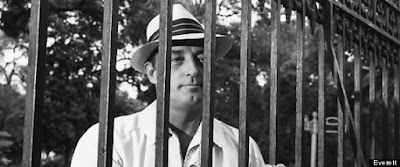I've written before about how Martin Scorsese's 1991 thriller Cape Fear is one of my favorite movies of all time -- and it is. But the 1962 original is no slouch either. it's slightly more forgotten now because the DeNiro-Scorsese film has lived on more in the popular imagination and I do think the latter version is the superior film, but viewed in tandem they present a fascinating crash course in how best to remake a film.
We are awash in remakes now and forever. The latest news is that there's going to be a new version of the Willy Wonka story, I assume an origin version, starring Timothy Chalamet as the iconic chocolate factory empresario,
I struggle with remakes because they're usually disappointing and they seduce you into checking them out because of your loyalty to the original. 1991's Cape Fear got it right because it was based on a film that wasn't necessarily already ubiquitous and the relaxing of censorship codes provided room for the actors and filmmakers to take the material in new, darker and more explicit directions.
Still, the 1962 original isn't without an edge. The key difference is Gregory Peck's stalwart hero is not as compromised and flawed as Nick Nolte's. Although viewed through a modern prism, his character is plenty bleak. He offers to pay off the Max Cady character (played wonderfully by Robert Mitchum) and towards the end of the film unapologetically conspires to murder him.
And while Scorsese's film is far more graphic in terms of DeNiro/Cady's sexual designs on the hero's wife and daughter, I was surprised by how many ways the original 'went there.' His attack on an innocent woman early in the picture is implied whereas in Scorsese's film we see the an unforgettable portion of the assault. But later in the film Cady makes it very clear and nearly does act on, his intention to sexually assault Peck's wife and daughter, in terms that were pretty shocking for a 1962 audience.
Apparently the 1962 film had to be cut to avoid an X rating and the word 'rape' had to be excised, and yet it was still seen as a fairly tawdry exercise because it involved sexual threats directed at a child. The remake is also still shocking in the directions it goes in. Scorsese throws everything in but the kitchen sink -- the film repeatedly alludes to and uses symbolism from the Bible -- and while the film was dismissed by some as a crass commercial exercise, it has always been one of my favorite of his films in part because he was willing to both make a more mainstream thriller without abandoning the themes he's obsessed with.
There are nods to specific scenes and story structure from the original -- enough to satisfy its fans but also not so much that it would alienate anyone who's encountering them. Do you need to know that Martin Balsam, Grgeory Peck and Robert Mitchum appeared in the original in order to enjoy their cameos in the new film, no, but it's nice to see them anyway.
Mitchum can't be quite as terrifying as De Niro is. He's not as physically imposing and Peck never seems as rattled by him as Nolte is. But he does have the same off-kilter sexual magnetism, which he also used to great effect in his most iconic role as the villainous preacher in The Night of the Hunter.
The Max Cady character, in both iterations, is one of the greatest of all movie villains because he is both self righteous and relentless. He's not supernatural (although the 1991 film suggests he is superhuman). And his singularness of purpose makes him both scary and appealing. The first film does a great job of realizing the terror a man like that could inspire -- and he newer version does what the best remakes do, it both enhances and doesn't harm the original.


No comments:
Post a Comment